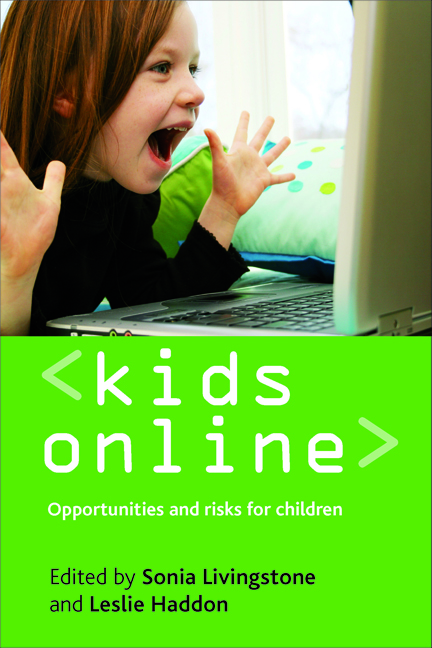Book contents
- Frontmatter
- Contents
- Notes on contributors
- Acknowledgements
- one Introduction
- Section I Researching European children online
- Section II Going online: new opportunities?
- Section III Going online: new risks?
- Section IV Policy implications
- Appendix A List of country codes
- Appendix B Children and parents online, by country
- Appendix C The EU Kids Online network
one - Introduction
Published online by Cambridge University Press: 15 July 2022
- Frontmatter
- Contents
- Notes on contributors
- Acknowledgements
- one Introduction
- Section I Researching European children online
- Section II Going online: new opportunities?
- Section III Going online: new risks?
- Section IV Policy implications
- Appendix A List of country codes
- Appendix B Children and parents online, by country
- Appendix C The EU Kids Online network
Summary
Few issues in the past decade have so dominated the headlines or captured the public imagination as that of children as online pioneers, in the vanguard of exploring and experimenting with new opportunities on the internet. Although many adults are also online, and although parents make considerable efforts to keep up with their children, it may seem that, one decade after gaining access en masse to online technologies, children and young people are living in a different world from that familiar to the adults who are bringing them up, teaching them what they need to know and designing policies to ensure their well-being. This new world has become invested with all the hopes and fears we have ever had for our children, but with a dramatic new twist because, it seems, everything is so much more available and easily accessible. One no longer has to go to the library or rely on a teacher for expert knowledge. Opportunities to meet people are no longer significantly constrained by transport, time and money. Many more have the chance to get involved in decisions that matter – local, national and even international. And most can find like-minded others who share their own particular hobby or interest. All this was beyond the scope of children growing up just a decade earlier. And the list of opportunities extends far further, both because the internet is now commonplace across the developed world and because all human life can now be found online.
But although the hopes are considerable, leading parents, schools and governments worldwide to invest in information and communication technologies (ICTs) to give children new opportunities, expanded horizons and a better chance in life, it is the associated dangers of the internet that dominate the headlines. Since all human life is now online, this includes many risks – bullies, racists, cheats and, the greatest fear of all, sexual predators. Although long encountered by children in one form or another, today these risks are more available and more accessible, readily crossing national borders to reach children anywhere, anytime, too easily escaping local and national systems of child welfare and law enforcement.
- Type
- Chapter
- Information
- Kids OnlineOpportunities and Risks for Children, pp. 1 - 16Publisher: Bristol University PressPrint publication year: 2009
- 4
- Cited by



